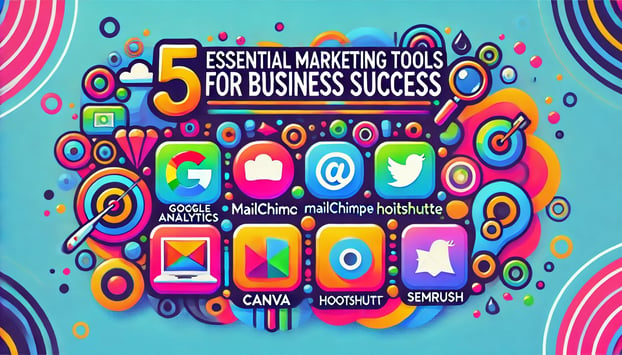5 Essential Marketing Tools Every Business Should Use to Succeed
Today’s business landscape is more competitive than ever, and good marketing is key to standing out. But as a small business or startup, the vast range of digital marketing tools can feel overwhelming. Thankfully, there are a few essential tools that can cover most of what you need to build an effective online presence. Here’s a look at five marketing tools that are simple, effective, and accessible—even for beginners.
Astitva Dubey
11/7/20243 min read


1. Google Analytics – Understanding Your Audience
Google Analytics is a free tool that helps you gather important data on who is visiting your website, how they’re getting there, and what they’re doing once they arrive. Knowing your audience better will help you make decisions that improve your website’s performance and attract more visitors over time.
Here’s what you can learn using Google Analytics:
Visitor demographics: Age, location, and interests of your audience.
Traffic sources: Where your visitors are coming from—social media, search engines, or direct visits.
User behavior: Which pages are most popular, how long visitors stay, and where they drop off.
Using these insights, you can focus your efforts on what’s working and identify areas for improvement. Google Analytics is beginner-friendly and offers plenty of free resources to help you get started.
2. Mailchimp – Building Relationships Through Email
Emails remain one of the most effective ways to connect with your audience. Mailchimp is a popular tool that makes email marketing easy, allowing you to reach your customers directly and build lasting relationships. It’s user-friendly, and even the free version has everything you need to get started with email marketing.
Here’s what you can do with Mailchimp:
Send newsletters: Share updates, promotions, or helpful information to stay on your customers’ minds.
Automate emails: Send welcome emails to new subscribers or reminders to customers who haven’t visited in a while.
Segment your audience: Group your subscribers based on behavior or interests, allowing you to send more relevant messages.
Mailchimp’s simplicity makes it ideal for beginners, while its features provide great value for businesses of any size. Emails are one of the best ways to build loyalty, and Mailchimp makes it easy to do so.
3. Canva – Creating Professional Graphics Easily
Good design plays a big role in capturing attention online. Canva is a design tool that allows anyone, even without design skills, to create professional-looking visuals for social media, blogs, and more. Its drag-and-drop interface and templates make designing easy, even if you’re just starting out.
Here’s how Canva can help your marketing efforts:
Social media graphics: Create eye-catching posts and stories for Instagram, Facebook, and Twitter.
Blog images and banners: Make your blog posts more engaging with custom graphics.
Business materials: Design everything from posters to presentation slides, giving your brand a consistent look.
Canva offers a large library of free templates, images, and fonts, so you don’t need to spend money to make high-quality designs. Canva’s ease of use makes it accessible for anyone, and it’s an essential tool for creating visual content that represents your brand.
4. Hootsuite – Managing Social Media Efficiently
With so many social media platforms available, managing posts can feel like a full-time job. Hootsuite helps you stay organized by allowing you to manage all your social accounts in one place. This tool is especially useful for businesses that want to stay active on multiple platforms without spending hours each day posting and monitoring.
Here’s what you can do with Hootsuite:
Schedule posts: Plan your social media content ahead of time and set it to post automatically.
Engage with followers: Respond to comments, mentions, and messages from different platforms in one place.
Track performance: See which posts are getting the most engagement, helping you understand what content resonates with your audience.
Hootsuite’s dashboard saves time and keeps your social media organized. For a beginner, it simplifies managing multiple platforms, ensuring you maintain a consistent presence without getting overwhelmed.
5. SEMrush – Improving Search Engine Visibility
Getting people to visit your site often depends on how well it ranks in search engines like Google. SEMrush is a tool designed to improve your search engine optimization (SEO), helping you identify the right keywords and improve your content’s visibility.
Here’s how SEMrush can help with SEO:
Keyword research: Find keywords that are relevant to your business and that people are actually searching for.
Site audits: Discover areas where your website could be improved for better SEO.
Competitor analysis: See what keywords your competitors are ranking for, helping you adjust your strategy.
Though SEMrush is a paid tool, its free features and trial period offer valuable insights into SEO. For small businesses, even basic SEO efforts can lead to better search engine rankings, helping more people find you online.
Conclusion
Getting started with these five tools—Google Analytics, Mailchimp, Canva, Hootsuite, and SEMrush—can help you build a strong foundation for your marketing efforts. They’re easy to learn, accessible for beginners, and cover the essentials of audience understanding, communication, design, social media, and SEO.
Try incorporating one or two of these tools, and as you get comfortable, explore the others. With a few good tools and a bit of practice, you can improve your marketing efforts and start reaching a wider audience effectively.
